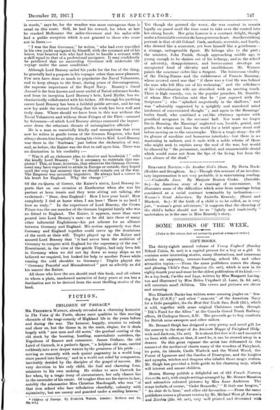FICTION.
CHILDREN OF PASSAGE!
MR. FREDERICK Wasson, already revealed as a charming humorist in The Voice of the Turtle, shows rarer qualities in this moving chronicle of the tragi-comedy of Highland life in the years before and during the war. The humour, happily, remains to refresh and cheer us, but the theme is, in the main, elegiac, for it deals largely with " new men and old acres," the gradual ousting of the old stock by the boosting, hustling, materialistic outsiders, the Napoleons of finance and commerce. James Graham, the old Laird of Correa, is a pathetic figure, " a helpless old man, carried ruthlessly into ever deeper waters by the greatness of his pride . . . moving so remotely with such quaint pageantry in a world long since passed into history," and in a world not ruled by compassion, inevitably derided by the disciples of the gospel of success. His very devotion to his only child, the frail and charming Iona, ministers to his own undoing. He wishes to save Garroch for her when, by a tragic irony of circumstance, her only chance lies in the surrender of his estate. Of tougher fibre are his sisters-in-law, notably the adamantine Miss Christina Macdougall, who was "of that iron school who face tribulation cheerfully, calamity with eqiianimity, but are uneasy and guarded under a smiling heaven."
• Ckadrers of PIMIlf I'. By Frederick Wattles, London: Methuen sad Co. ifs, set.1
Yet though she guessed the worst, eke wee content to remain loyally on guard until the time came to take over the control into her strong hands. Her grim humour is a constant delight, though under a formidable exteriorshe hese generous heart. Another striking portrait is that of old Colonel Cask, sardonic, eccentric, and lonely, who dressed like a scarecrow, yet bore himself like a gentletnan- a strange, unforgettable figure. Ho belongs also to the past ; the minister, John Parish, though approaching middle age, is young enough to be shaken out of his lethargy, and in the school of adversity, disappointment, and bereavement develops en unexpected fund of chivalry and unselfishness. Mr. Watson paints the nouveaux riches like a Sargent. The 'mister°us vitality of the Ewing-Dunne and the ruthlessness of Fronde Manning, whose avowed creed was that " if there was a God He was behind the matt who left Him out of his reckoning," and the selfishness of his valetudinarian wife are described with an amain touch. There is high comedy, too, in the popular preacher, Dr. Bumble, of whom Miss Christina said that he " just capered with the Scriptures " ; who "splashed mejedtically in the shallows," end was " admirably supported by a sprightly and anecdotal mind intolerant of concentrated thought " ; and again in the Hermitage' butler Small, who combined a cat-like efficiency upstairs with pontifical arrogance in the servants' hall. Nor must we forget Davie Manning, the Manning& neglected son, lovable, genial, and gentle, for whom and Iona the world for a brief space stood still before moving on to the catastrophe. This is a tragic story—tor all its gleams of sunshine and humorous interludes—but there is no wantoning in sadness, and it ends with a noble rebuke of those who might seek to explain away the soul of the war, but would be silenced by " the permanent, undefiled, and unanswerable denial which would come not from the lips of the living, but from the vast silence of the dead."


























 Previous page
Previous page